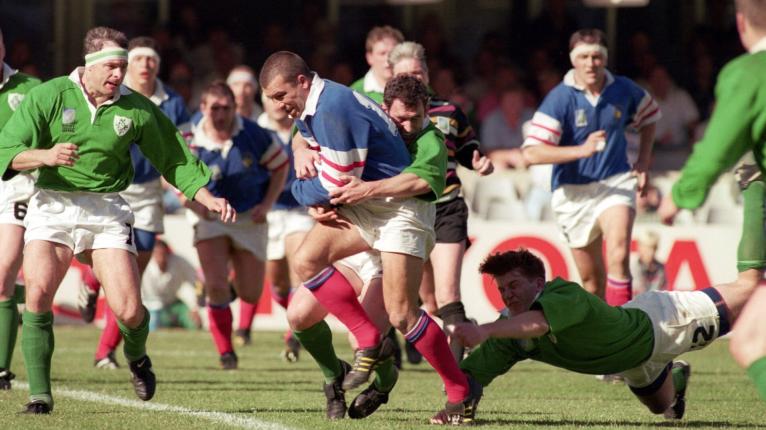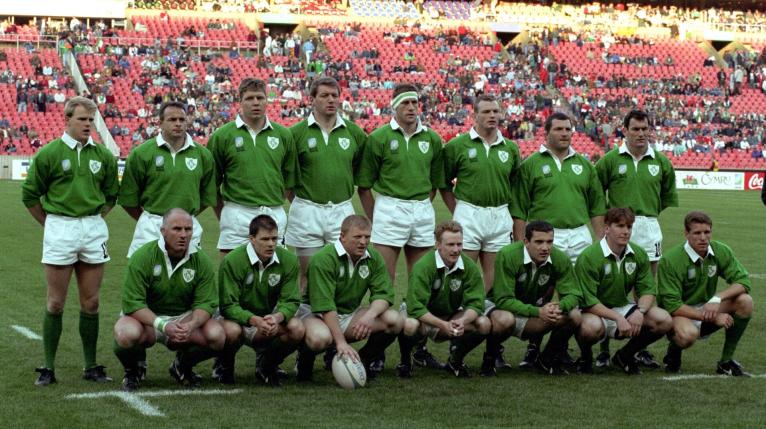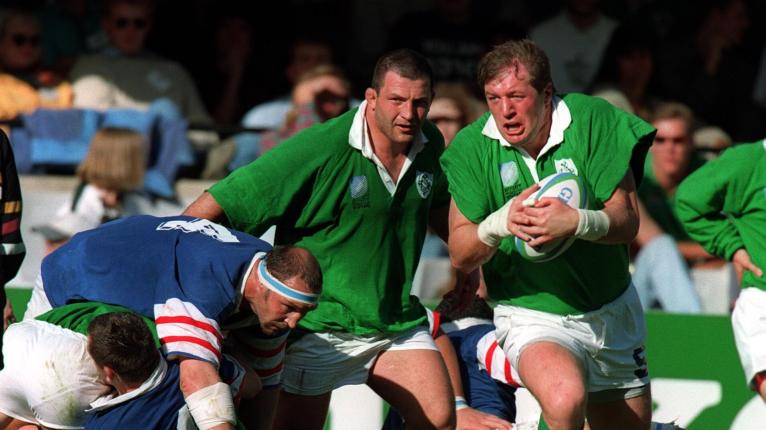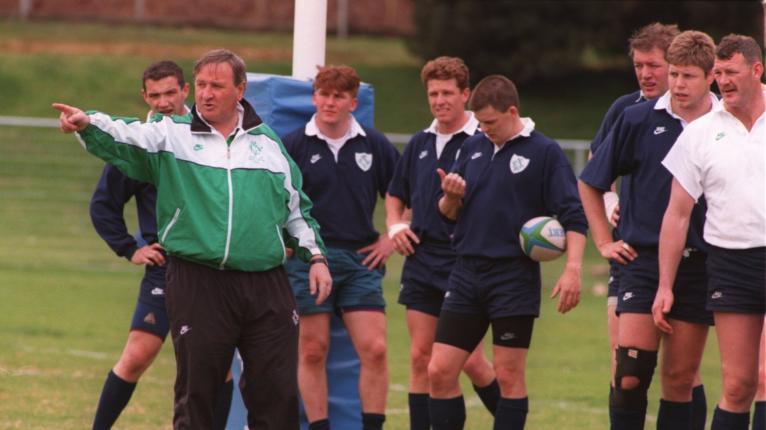Where are they now? The last Ireland team of the amateur era 25 years after their 1995 World Cup exit

June 10 marks the 25th anniversary of the last Ireland team to take the field in the old amateur era. Having defeated Wales to emerge from their pool as runners-up at the 1995 World Cup finals six days earlier in Johannesburg, the Gerry Murphy coached Ireland moved on to Durban to face France in the quarter-finals.
The theory was that heading back to sea level after being on the highveld would suit the Irish, but that notion was as bogus as the pattern of Ireland performances during the 1990s – they’d give it a lash for a certain period of time before they would woundingly fall away in the second half of games.
What happened at Kings Park was illustrative of how they simply weren’t an 80-minute team at that time. They managed to get to the break trailing by just three points, four Eric Elwood penalties making it 12-15, but any thoughts that the second half would be equally as competitive were unfounded.
Instead, the physically superior French painfully pulled away, tries from Emile Ntamack and Philippe Saint-Andre – allied to the boot of Thierry Lacroix – pushing the margin out to 24 points, 12-36.
History has since been kind to this Irish team in the sense that their failure to push on beyond the quarter-finals has become the norm for the country – Ireland have failed to reach the last four in any of the nine World Cups they have now played in and the manner of their recent 2019 exit was as ruthless as any, Joe Schmidt’s team shredded by the All Blacks in Japan. What became of the Class of 1995? RugbyPass takes a step back in time:

15. Conor O’Shea: The Mr Rugby of the Ireland team in the sense that the sport has provided his high profile livelihood ever since the day it turned pro. The Leinster full-back was soon at London Irish, linking up with then-coach Clive Woodward and going on to win the remaining 22 of his 35 Test caps playing for the Exiles. His last came in a 2000 hammering at the hands of Woodward’s England at Twickenham and after injury forced his retirement, a coaching adventure began at Irish that has since taken him to the RFU, the English Institute of Sport, Premiership title glory with Harlequins, tough times in charge of Italy and now, at the age of 49, back to the RFU as its director of performance.
14. Darragh O’Mahony: The now 47-year-old from Cork had a limited Test career, just four caps in total. However, while it fizzled out with a final appearance versus Romania in 1998, the 13st winger had a far more successful time at club level, becoming a try-scoring cornerstone of the Saracens backline after making a name for himself as a finisher at Bedford and Moseley. He finished his career at home with Dolphin before returning to banking, an occupation that has taken him back to London where he has been with Allied Irish Banks (GB) for more than a decade.
13. Brendan Mullin: Durban marked the end of the road for Mullin’s international career, the defeat to France being the last of his 57-cap career which had begun with a November 1984 defeat to Australia. South Africa was Mullin’s third World Cup finals and the Leinster player also toured Australia with the ’89 Lions. He worked in the financial services industry during his long rugby career and continues to do so. Now 56, he hasn’t been immune to professional rugby. He acted as chairman of London Irish Holdings during the 2000s, while his 22-year-old son Gavin – another midfielder – is currently part of the Leinster set-up under Leo Cullen.
12. Jonny Bell: The Ulster centre had most of his Test career ahead of him coming out of South Africa, going on to win 28 of his 36 caps after the Durban defeat. He decided to give English rugby a try, linking up with Northampton for the 1997/98 season, but he returned to Ulster to win the 1999 European Cup. His last Ireland cap came in 2003, against Italy in Limerick, and he retired two years later. He initially became a PE teacher but pro rugby coaching soon reeled Bell in, working his way up the ranks to Ulster assistant before joining David Humphreys at Gloucester in 2015. Now 46, he has just left Kingsholm to become attack coach at Glasgow.
11. Simon Geoghegan: The pin-up of Murphy’s Ireland team, his place in the hearts of Irish fans was guaranteed with his match-clinching try in the 1994 Twickenham win over England. He moved to Bath from London Irish soon after but injury ruined an exciting career that should have continued to soar high. The now 51-year-old had a 37-cap Test run but he played just five more times for his country after the ’95 finals. He’s now a partner in the Rosling King law firm in London, specialising in real estate transactions.
10. Eric Elwood: The now 51-year-old Galwegian won the 14th cap of his 35-match Test career in the loss to France, his final cap arriving at the 1999 finals when he started against Romania. Rather than join the exodus of Irish players who headed to England after the game turned pro, he continued to use the All-Ireland club league as his pathway into the national side and he was Connacht’s record appearance holder on 168 by the time of his provincial retirement in 2005. A sales rep for Irish distillers before turning pro, he went into coaching after he finished playing, working his way up to become Connacht director of rugby for three seasons. Took some time away from the game after that but is now Connacht’s domestic rugby manager.
9. Niall Hogan: The now 49-year-old doctor had just broken onto the Test scene in time for the 1995 finals, the quarter-final being just his fifth appearance in a career that ended on 13, his last cap coming in the 1997 defeat away to Italy. He played in the Premiership for London Irish and was one of four players who successfully sued the Exiles for breach of contract after being released in 1998. The ex-Leinster No9 is now a consultant orthopaedic surgeon at the Dublin-based Sports Surgery Clinic, specialising in knee and hip replacement surgery.
1. Nick Popplewell: Fifteen of the Leinster loosehead’s 51 caps came after the 1995 RWC, his Test career ending as a sub in the 1998 loss to France. He had debuted in 1989 against the All Blacks, going on to become a Lion on the 1993 tour while working as a sales rep. Became a broker in London before hooking up with the Premiership title-winning Newcastle. The now 56-year-old has since forged a career as a property sales specialist with Sherry Fitzgerald in Wexford.

2. Terry Kingston (captain): 1995 was the now 56-year-old Corkman’s third World Cup, his 30-cap career not having long to run after quarter-final elimination. There were just four more Test appearances, his last being a 1996 championship defeat to the French, and his final run with Munster was a fixture later that year versus the touring Australians. Away from rugby, the ex-hooker has dabbled in some club coaching while forging a career in business development, sales and leadership.
3. Gary Halpin: The loss to the French was the last of the tighthead’s eleven Test appearances, his 1995 RWC campaign infamously remembered for his middle finger salute to the All Blacks after he scored an early lead-taking try in the opening pool game. London Irish was his pathway into club pro rugby followed by a switch to Harlequins. A teacher by trade, the now 54-year-old worked at a number of schools in England before returning to Ireland in recent years to become director of boarding at Roscrea’s Cistercian College.
4. Gabriel Fulcher: The now 50-year-old was a stylish lock who enjoyed a 20-cap career with Ireland, his last appearance coming away to South Africa on the 1998 tour which was after a few seasons spent in the Premiership with London Irish. He returned to Ireland to play a couple of years with Leinster before switching into coaching, working at schools and Leinster underage levels before emigrating to Canada in 2015. Now works as a self-employed writer, based in Ottawa, following qualifications in creative writing and fine arts at UCD.

5. Neil Francis: The current contrarian of the Irish rugby punditry scene, the former Leinster second row has developed a high profile media platform where he isn’t shy in running a very critical eye over the game away from the day job where he works for Renault’s Irish financing arm. South Africa 1995 was the now 56-year-old’s third World Cup. He won the last of his 36 caps the following year at home to Scotland.
6. David Corkery: The now 47-year had a 27-cap Test career, the elimination to France his eighth appearance in a run that ended on the 1999 tour to Australia. By then he was playing professionally in England with Bristol. Has since forged a career in sales on returning to Cork, now working as business development manager for Affidea. The former back row has coached at All-Ireland League level and has a reputation for opinionated media punditry.
7. Denis McBride: The now 55-year-old former openside had a 32-cap Test career, ten of those appearances coming following the 1995 finals. He forged his reputation at Ulster, then serial winners of the Irish interprovincial championship. Having worked at Ballylumford Power during his rugby career, he is now with the AES Corporation as their market integration and services manager.
8. Paddy Johns: The now 52-year-old dentist won 59 caps between 1990 and 2000 but having played at No8 in the ’95 quarter-final, most of the appearances that followed came in the second row. He jumped into the professional game, moving to London to become part of the furniture at Saracens. He then returned to dentistry after his rugby career ended and works with the Southern Trust, the authority responsible for healthcare in the southern region of Northern Ireland.

USED SUB – Eddie Halvey: It was Halvey’s try during a short cameo off the bench that had beaten Wales the previous weekend in 1995 – his fifth appearance in an eight-cap career that ended in November 1997 versus Canada. The now 49-year-old back row took up professional rugby at Saracens where he was highly thought of but homesickness saw him return to Munster before he had a second go in London, this time with 2002 Powergen Cup winners London Irish. He ended his career at Munster and was later involved in a fatal drink driving incident.
UNUSED SUBS – Michael Bradley: The scrum-half earned the last of his 40 caps in the RWC opener versus New Zealand. Now 57, he went on to coach at Connacht, Edinburgh and Georgia and is now boss at PRO14 Zebre.
Philip Danaher: Another whose last cap had come prior to the France loss, the midfielder’s final appearance in his 28-cap career taking place against Wales in the previous March’s Five Nations. The now 54-year-old soon became assistant coach for Warren Gatland’s Ireland in 1998. Now runs McDonald’s franchises in the Limerick area.
Paul Burke: The now 47-year-old out-half earned 13 caps in eight years, enjoying a points-filled Premiership career with Bristol, Harlequins and Leicester. Also featured for Munster. He went on to coach at Tigers but was pushed aside and is now working at Epsom College as director of rugby.
Paul Wallace: One of three Wallace brothers to be picked for Ireland, the prop made his debut at the finals in South Africa versus Japan. He won 45 caps for his country and three more on the 1997 Lions while also enjoying a pedigree career in the club pro ranks at Saracens before finishing up at Leinster. The now 48-year-old is managing director at Bircroft Ireland, a commercial property financing company.
Shane Byrne: The man with the mullet incredibly had to wait until June 2001 to finally earn his debut Test cap but once the now 48-year-old former Leinster hooker finally got on the field, he proved difficult to shift. By the time he was done, he had earned 41 Ireland caps and four more with the 2005 Lions. He finished his career at Saracens and has since worked in the family waste disposal business.
'It did turn sour'
Ed Griffiths' behind the scenes insight into the Springboks 1995 #RWC win 🇿🇦, the back story to the Mandela moment, confronting flag-waving fans, holding clothes hangers for luck & the lost opportunity of it all
– writes @heagneyl https://t.co/XpSHESE4cF
— RugbyPass (@RugbyPass) May 24, 2020













































